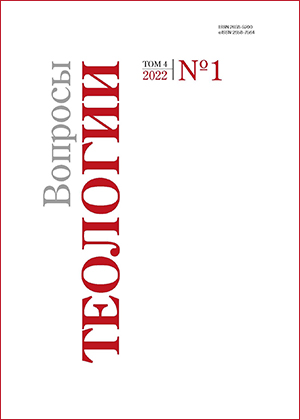A portrait of the teacher for the West in the interior of the Synodal era: Dissertation by I. V. Popov on Blessed Augustine
DOI:
https://doi.org/10.21638/spbu28.2022.103Abstract
Early 20th century Russian academic theology showed considerable interest in St. Augustine’s theology. Among a significant number of works on the latter, one that stands out in terms of its scale and being well-founded, the doctoral thesis “The personality and legacy of St. Augustine” (1916) by I. V. Popov, a professor of the Moscow theological academy. Although the first volume of the Popov’s work is the only one that remains, it is of substantial interest because it witnesses the continuous intellectual evolution of its author, who made a sharp turn from the Eastern patristics towards the Western patristics in his studying the topic of “deification.” However, today there is no unanimous agreement among scholars on the presence of “deification” concepts in the Western theology, and Popov himself does not use the term “deification” in his doctoral thesis. Nevertheless, Popov’s conclusion that “ontologism,” being understood as the possibility of a direct communication with God in this life, was characteristic of St. Augustine represents in some sense the next stage of Popov’s search for an organic integration of the moral and mystical contents of Christian life. Containing an implicit but relevant for the early twentieth century critique of Harnack’s rationalism, Popov’s work had as well an impact on the mid-twentieth century Russian thought, having been in demand in the diaspora. It should be especially noted that, despite its unconditional significance both for the history of Russian patristics and of Russian theology in the twentieth century Popov’s “Augustine” has not attracted special attention of researchers so far.
Keywords:
deification, mystical knowledge of God, new theology, ontologism, practical reason, apophaticism, moral monism
Downloads
References
References
Downloads
Published
Issue
Section
License
Articles of "Issues of Theology" are open access distributed under the terms of the License Agreement with Saint Petersburg State University, which permits to the authors unrestricted distribution and self-archiving free of charge.




